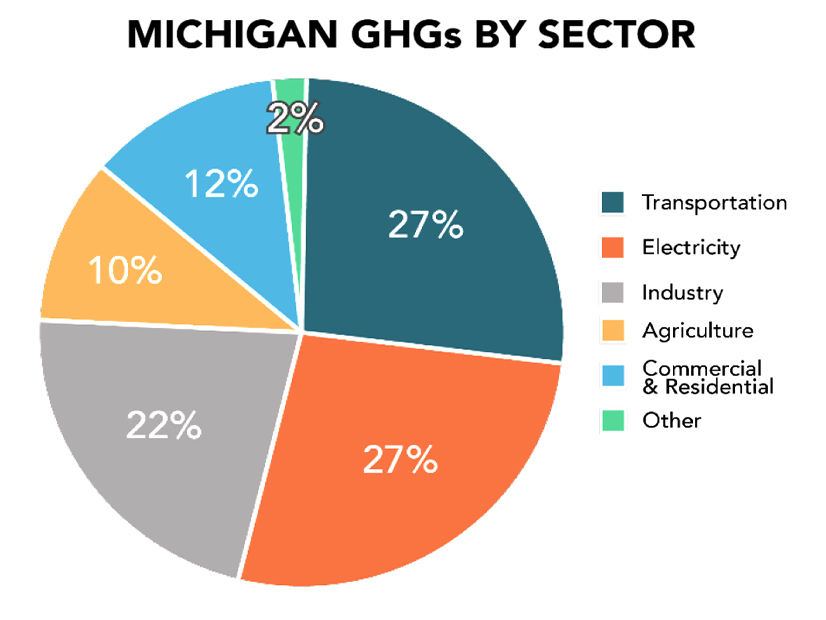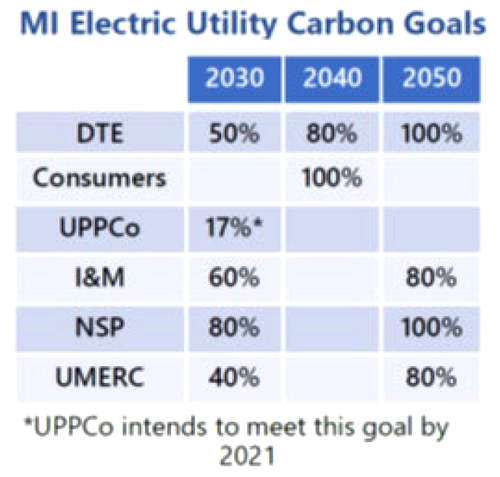
LANSING, Mich. — Michigan would have at least 2 million electric vehicles and get 50% of its electricity from renewable energy by 2030 — while ending coal use by 2035 — under a draft climate proposal sent to Gov. Gretchen Whitmer (D) Friday.
The Department of Environment, Great Lakes, and Energy’s (EGLE) proposed Healthy Climate Plan, a roadmap for reaching carbon neutral status by 2050 required by a 2020 executive order by Whitmer, will be open to public comment through Feb. 13.
“Michigan communities and families are taking hit after hit from power outages, extreme heat events, flooding and sewer backups caused by intense rains,” the report said. “Our farmers are struggling to adjust and survive as temporary thaws result in frozen fruit blossoms thinking spring has come early, drenching storms inundate fields one day and then disappear into extended periods with no rain at all, and new insects migrate from warmer climates each year threatening our gardens, forests and crops. Disease-carrying ticks — in places we have never seen them and in previously unimaginable numbers for our state — add hassles and health risks to the outdoor [adventures] so many of us cherish.”
Input
In a letter accompanying the proposal, EGLE Director Liesl Eichler Clark said the plan was “first and foremost a Michigan plan.”
“We heard from environmental justice, public transit, and local food advocates; an array of business executives and labor leaders; academic experts and local government officials; and concerned residents of all political persuasions and walks of life,” she said.
The Council on Climate Solutions — 14 residents and representatives from the Departments of Agriculture and Rural Development, Labor and Economic Opportunity, Natural Resources, Transportation, Health and Human Services, Treasury and the Public Service Commission — provided detailed recommendations, along with the Climate Justice Brain Trust and others.
Clark, who chaired the climate council, called the proposal comprehensive, impactful and considerate of how residents’ pocketbooks will be affected.
But in reviewing the draft — which winnowed down dozens of proposals made by the council’s workgroups on issues like transportation, buildings, agriculture and equity — some council members urged the state to take bolder action.
“Can we make this more aspirational?” Jonathan Overpeck of the University of Michigan, one of the more outspoken council members, said at a meeting Tuesday. Proposals such as permitting coal use until 2035 allow “people to say we’re just kicking it down the road,” he said.
The council will review comments on the draft Feb. 22 before issuing the final proposal to Whitmer by March 14.
The draft plan’s main goal is to cut carbon emissions by 28% by 2025 and 52% by 2030 before reaching carbon neutrality by 2050.
Benchmarks
To reach that goal, the plan calls for a 50% renewable energy standard by 2030 and 100% renewable energy in state buildings by 2025, with a 40% reduction in their energy intensity by 2040. Although coal once generated most of Michigan’s electricity, the report noted, only one coal-fired power plant will operate beyond 2028, according to utility retirement schedules.
 Michigan’s electric utilities have pledged to cut their carbon emissions by between 80 and 100% by 2050. | Michigan Public Service Commission
Michigan’s electric utilities have pledged to cut their carbon emissions by between 80 and 100% by 2050. | Michigan Public Service Commission
The plan also calls for putting solar generation facilities on state-owned land and for the state to help local governments in developing “best practices” for their own solar projects.
To meet the transportation goals, the proposal calls for establishing low-carbon fuel standards and incentives for EV purchasers. It also recommends the state move to more fuel-efficient vehicles and EVs — the Michigan State Police recently tested an electric Ford Mustang as a potential pursuit vehicle — along with aiding local governments and school districts toward climate friendly fleets.
The plan also calls for the state to electrify public transit and boost access to it. The Detroit area has struggled for decades to develop a public transit system that serves both the city and suburbs, and expanding public transit, especially in Metro Detroit, has long been a goal of environmentalists.
To address building emissions, the proposal recommends investing in the Michigan Saves Green Bank, a nonprofit bank set up to help finance home and commercial energy efficient projects.
The proposal says the state, which last updated its building code in 2015, should adopt the 2021 International Energy Conservation Code. It also calls for annual waste-reduction goals of 2% for electricity and 1% for natural gas.
However, the proposal does not call for an end to natural gas use, as some members of the council and environmentalists speaking at public comment sessions through 2021 had called for.
To ensure equity and justice, the plan says 40% of state funding for climate-related initiatives should benefit economically disadvantaged communities, echoing President Joe Biden’s “Justice40” initiative. The state proposal also calls for adjusting job training programs to assist students getting jobs in clean energy.
Economic Impact
The plan portrays its recommendations as essential to both continuing the state’s leadership in automobile production and attracting new businesses, citing research that lists clean energy and sustainability among the top factors in corporate location decisions. It noted Site Selection magazine’s 2021 Sustainability Rankings listed the state at No. 3 for sustainable development, with Grand Rapids and Lansing ranked the U.S.’s No. 2 and No. 6 metros.
The plan also said the changes will ensure that the state — “with the highest concentration of engineers in the nation and a skilled trades workforce ranked in the top ten” — remains a leader in auto production as GM, Ford and Chrysler transition from internal combustion engines to EVs.
Actions Across State Government
The report noted involvement in the climate council of numerous departments in addition to EGLE. “In order to meet the moment, every department must be a climate department,” it said.
EGLE has developed a the “Next Cycle Michigan” initiative to increase the state’s recycled materials supply chain. The Treasury Department has launched the Energy Transition Impact Project to help communities and workers affected by coal plant closures. The Department of Natural Resources is seeking strategies for responding to climate-based threats to natural resources. The Department of Labor and Economic Opportunity expanded job training and workforce development programs to include clean energy and mobility opportunities. The Department of Transportation developed Mobility 2045 to prepare transportation systems for climate challenges and new technologies.
Overall, council members were supportive of the EGLE proposal, but some wanted to see the state act more aggressively and take a leadership position among the states. Phil Roos, CEO of consulting firm Great Lakes GrowthWorks, said Tuesday it was clear the proposal was “really striving for leadership.” But he said the state could adopt greater specificity and earlier deadlines.
Clark called the plan a “living document,” acknowledging that the state will have to make course corrections on the way to 2050. “Some of the solutions to get to a 100% decarbonized economy that deliver good jobs and justice for Michiganders are still very much on the drawing board. But much of the path to carbon neutrality is already well known to us,” she said. “While there are complexities in every aspect of this plan, most can be overcome if we simply commit to getting the job done and equitably sharing the burdens and benefits.”


